MMORPG’s (Massively Multiplayer Online Role-Playing Games) have had a rough time over the last ten or so years. Usually set in huge open worlds and consisting of questing, fighting, crafting and raiding, these games are known for huge amounts of content, long grinds and high skill ceilings. Though the genre originated in the mid-’90s, most people my age probably first experienced it in the early 2000s, during a golden age. Runescape, Everquest and Phantasy Star Online set the standard and got people interested in what could be done with online worlds populated by hundreds of players. The market was saturated back then with companies trying to follow the trend and break into this emerging, lucrative scene. A few titles from the era still persist to this day – Maple Story, Silkroad Online and Eve Online to name a few – but it is expensive to make and maintain only the most successful survived and most folded after a couple of years. RIP Toontown and City of Heroes. For many, it was the subscription nature of the titles that usually killed them, as many weren’t willing to pay the sky-high prices of access long-term; especially after an onslaught of free alternatives began to appear.
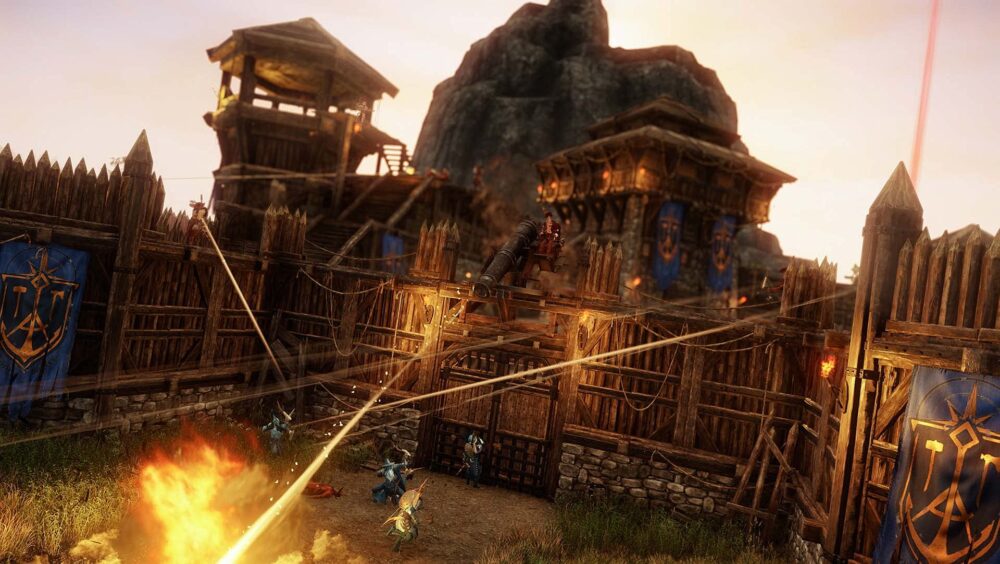
In 2004, however, the genre-defining hit World of Warcraft was released, and after a number of expansions it arguably still reigns today as the king of the genre, despite rapid player loss over the last year in particular. The genre didn’t die – not at all – but the boom ended in the early 2010s and very few new titles have been able to stick over the last five years. As of right now, the big dogs are World of Warcraft, Final Fantasy XIV, Guild Wars 2 and my personal favourite, The Elder Scrolls Online. Whilst these four titles are very much still popular and supported, all have started to show their age and the genre is well overdue for some new blood.
You could say that New World is the first of the next generation of MMORPG’s – and prior to release it was expected to blend higher-end graphics, more modern gameplay concepts and new ideas with the successful models of MMO’s past. Now that it’s released though, does Amazon’s first game release set the new standard or is it doomed to fail like the hordes which came before it?
Some people say that an MMORPG can only ever be as good as the world it’s set in. New World is set in a fantasy version of the “New World,” the term originally used to refer to the Americas during the 16th century age of discovery. In my understanding, the original intention was for it more accurately to represent the colonial invasion of said New World, but thankfully this was pivoted from with the final setting being similar in time and place, but without the colonial undertones. The island, in particular, is known as Aeternum; a beautiful, isolated place on which the dead don’t stay dead for long. Populated by human players, ancient undead, corrupted monsters and those who have gone insane from returning to life too many times, the setting is somewhat interesting, even if its vastness sometimes feels a little empty – aside from the overwhelming number of harvesting points. Each world area feels unique enough at first, with some places having very Amazonian vibes and others feeling very Pirates of the Caribbean.

It feels incredibly immersive to walk around Aeternum and run through the lush jungles and destroyed farmsteads, but in hindsight, there aren’t really any particularly memorable areas – they simply blend into one another. Especially in the early game, you find yourself running through another farm, another ruined area, another piece of wilderness. Most of your interaction with non-hostile characters takes place inside the various towns, but again, they feel so similar that I don’t think I’d be able to tell one from another. These hub areas are nice, sure, but they aren’t that unique. The individual characters in each are forgettable, and whilst I can see they tried to give them individual characteristics many blends together. An exception would be the factional characters, which all have more uniqueness to them; from secretive creepiness to religious zealotry.
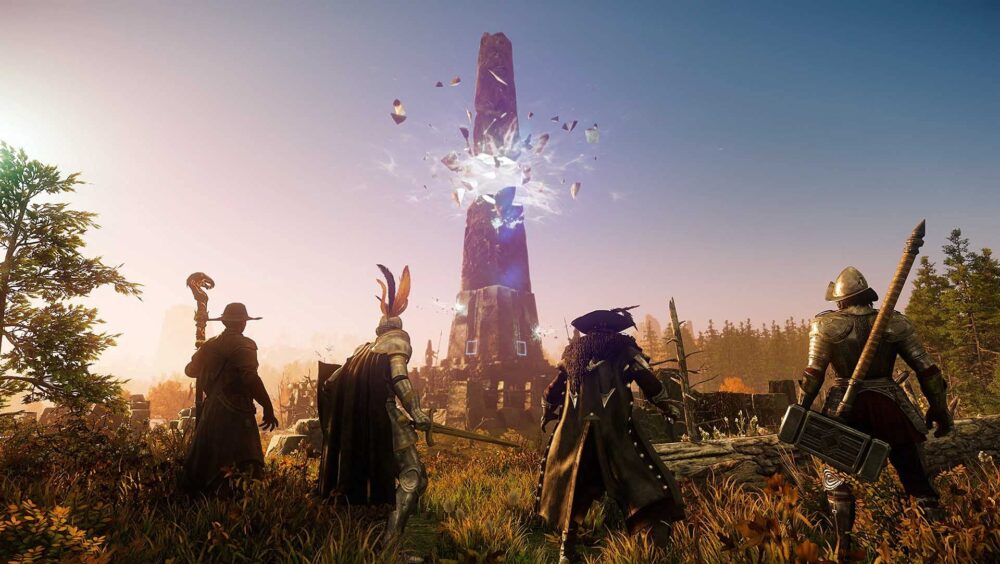
This general blandness extends into the story. The overarching world is under threat from another glowing, red corruption. In standard MMORPG fare, it’s ever-present and doesn’t seem to actually be stoppable, so the main story concerns itself with figuring out exactly what’s happening on the island and the revival of the Soulwardens in order to fight it. It’s exactly what you’d expect, but with some additional twists. Unfortunately, it doesn’t really create a solid hook for the player and I struggled to engage with the greater main story. Quests as a whole feel very bland in New World, mainly consisting of “go here, kill this” or “go here, open chests” or “go here, collect this.” Whenever you get a quest, it usually follows this kind of pattern, and it does nothing to add interest to the game. They blend together endlessly in a slow, yet fun grinding loop, and whilst this engaged me somewhat my enjoyment wasn’t connected to the filler text – only the act of adventuring and levelling up. The loop itself is good, I’ll admit, but I honestly want more from an MMO and it can get stale very quickly, especially as you reach higher levels. Whilst out on these quests, you also encounter a number of harvestable resources, and again whilst I enjoyed hunting for these the amount of time it took to harvest each was unbearably long; think RDR2 levels of faff. All of this together makes me simply feel like New World doesn’t respect my time. The loops on their own are fun enough, but there’s nothing beyond that, nothing to make one invested long term or engage. Whether you’re killing and questing or harvesting and crafting, progression feels like a slog; at least in PvE and the overworld. What also doesn’t help is how the fast travel system works, requiring a rare resource to be spent. Again, it’s a clunky design decision that doesn’t respect your time and I simply wish the cost would be removed.

Luckily, in stark contrast to the uninspired questing and fun, yet slow resource gathering, the combat really excels. Unlike most MMO’s, New World takes an active approach to battle. Yes, there are some WoW-style abilities with cooldowns, but the combat has more of a resemblance to the light/heavy attack style of Elder Scrolls Online and a truly classless system. You have separate attribute scores and weapon levels, with attributes dictating the effectiveness of your combat abilities. The interesting thing about this system is that you allocate skill points to your weapons separately, so on switching weapons you don’t need to reallocate. This allows for a lot of flexibility in build and the levelling process, and the fact it’s actually impossible to unlock every weapon skill and passive at once forces the player to really think about what you want from that weapon. Some weapons are more fun than others – with my personal favourite being the Ice glove. It’s a fun, unique system that really differentiates it from other modern MMOs, and I can easily call it the highlight of the game.
Whilst the harvesting takes a little too long, the crafting resulting from it is quite a fun time. I like how many things, especially foodstuffs, don’t require specific ingredients to craft, and instead will settle for grades of ingredient. This streamlining makes a process that could otherwise be a little tiresome much more fluid and interesting. It simply means that you can engage in farming for ingredients without the same level of timesome waiting that happens every time you harvest wood.
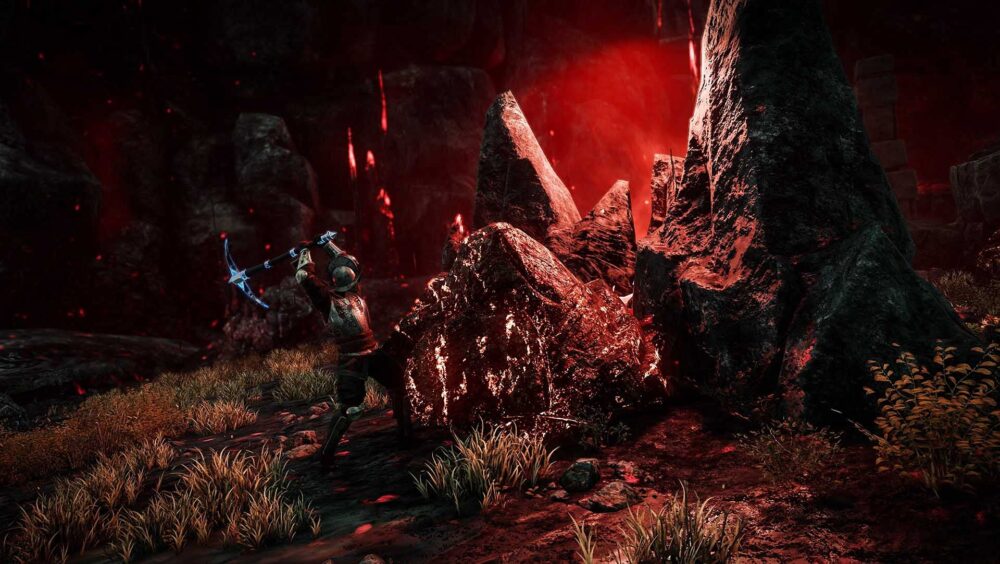
The stand-out element of New World has to be the PvP element. It’s the one big component that makes it interesting above other MMORPG’s in my opinion, and whilst the PvE plots and quests do little to create engagement, the dynamic, player-led politics and stories really got me interested in continuing. Each settlement in the game can be captured and controlled by a company; essentially a clan or guild inside the wider faction system. These companies control taxation and many other facets of the experience, and the conversations and discussions within the world around each company and how they are managing their areas can be fascinating. Quite a few times I’ve seen the controllers of the early game areas – of which there are four with the same level requirements – fighting for player engagement and goading each other. One will have higher taxes but be really popular with the most powerful faction in charge, but suddenly another area will drop taxes drastically causing an exodus and a race to the bottom. It’s fascinating and added weight to the surrounding systems. Territories are claimed through all-out 50 v 50 warfare, conducted at a set, pre-determined time once an opposing faction has gained enough influence through overworld PvP activities and quests. You can join a company’s effort temporarily to fight in these, even if you don’t fight for that faction or company generally, and these can shift a world’s politics drastically. Outpost rush is another similar mode, but on a smaller scale which is designed primarily for top-level players.
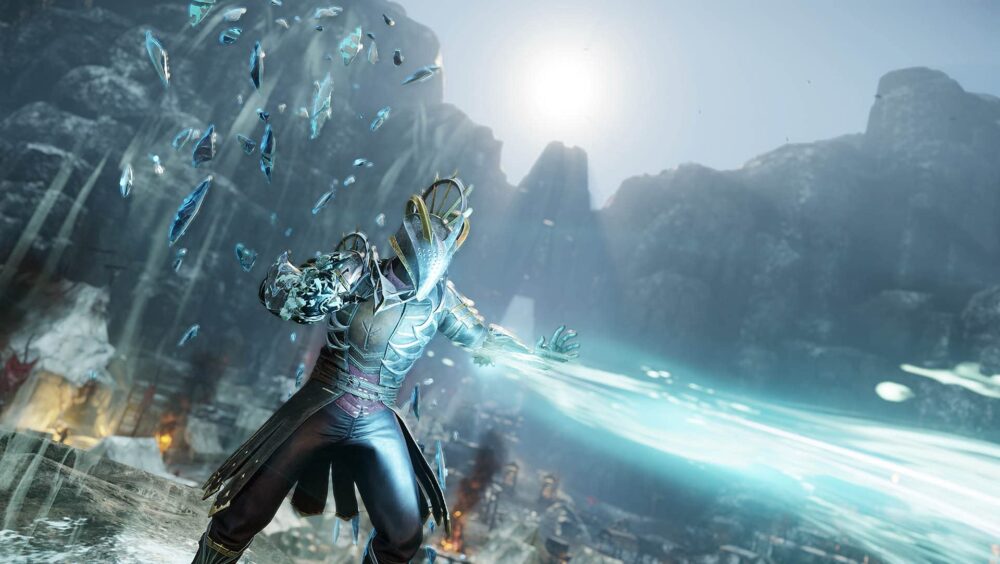
The overworld PvP is also pretty cool, as it’s completely integrated into the rest of the game. You can freely toggle your PvP status at settlements, allowing you to opt-in to fight other players. This sounds scary, but luckily the level of yourself and your opponents are nicely balanced so that it is primarily gear and weapon skills which make the difference. I’m not generally a PvP fella, but it’s much better than other similar implementations I’ve seen and the fact you can opt-in and out means that if you don’t want to get involved you don’t have to.
Visually, New World is pretty beautiful, although I would argue that it doesn’t really look all that next-gen. Performance isn’t too bad, even on older hardware, but I feel for those with killer rigs who may have hoped for more. It sounds good too, with the voice acting being a particular highlight and featuring a variety of accents.
With all this in mind, however, I do worry about the long-term health of New World. MMORPGs are a long-term investment for both the player and the developer, and unfortunately, I don’t think the players are going to stick around. There’s lots of content initially, granted – even if it pales in comparison to ESO’s initial offering – but the end game is weak at best with only a few raids and PvP being there for those willing to grind to the top. I can’t see many people getting there to start with, and I can foresee even less waiting for more content. Indeed, since release, the player count has dropped rapidly to the point where Amazon has had to merge servers to maintain populations. Considering they added loads on launch to keep up with the practically shameful que times, it’s embarrassing at best and at worst a sign that people just aren’t sticking around after they reach max level.

I really wanted to love New World, but it has far too many problems to make me consider switching over the long term from my current squeeze. From boring, mindless quests and plot to lacklustre end-game content and time-wasting mechanics, I don’t think it’ll be on my PC for much longer unless they go through an FF14-style revamp. If you liked RDR2 for everything but the quests, or you like the sound of the dynamic PvP and community features you may find a home for yourself in New World. Unfortunately, I can’t see many people doing so and if history tells us anything it’s that mega-corporations are more likely to turn off a dying game’s life support than actually improve it.
Grab New World for as a low as £34.99 on Amazon here
Enjoy the review? want to read more of our reviews? then click right here to be whisked away to the realm of our opinions.

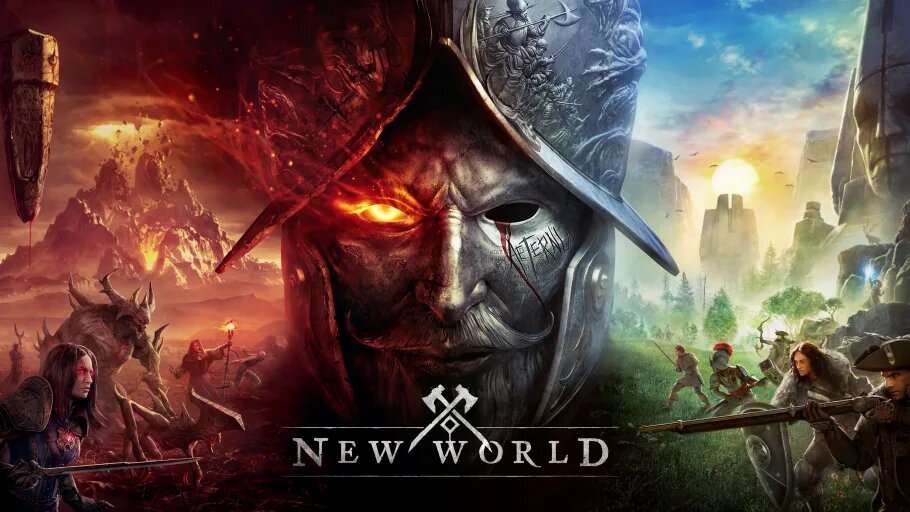






You must be logged in to post a comment.